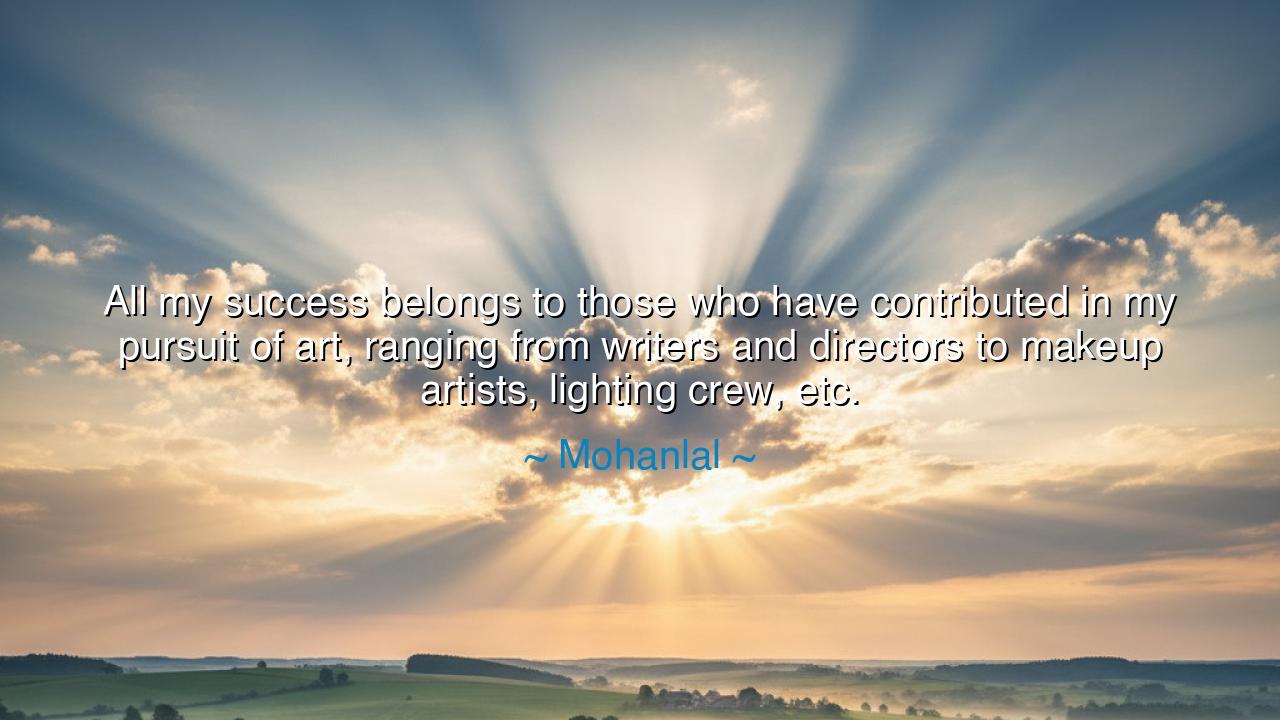
All my success belongs to those who have contributed in my
All my success belongs to those who have contributed in my pursuit of art, ranging from writers and directors to makeup artists, lighting crew, etc.






In the words of the great actor Mohanlal, we hear a truth both simple and profound: “All my success belongs to those who have contributed in my pursuit of art, ranging from writers and directors to makeup artists, lighting crew, etc.” This is no mere statement of humility, but rather a declaration of eternal wisdom. For in it lies the recognition that the crown of triumph never rests upon a single brow alone, but is woven by countless unseen hands, each thread essential, each color divine.
In the ancient days, wise teachers would remind their disciples that a tree stands tall not by the pride of its branches, but by the secret labor of its roots. So too does the artist thrive, not by his solitary genius, but by the unseen toilers—the writers who shape words, the directors who guide vision, the makeup artists who sculpt the face of illusion, the lighting crew who summon shadows and radiance. These are the unseen pillars of glory, without whom the great edifice of success would crumble like dust in the wind.
Let us recall the tale of Alexander, called “the Great.” His armies conquered far lands, his name thundered across continents, yet he himself declared before his soldiers: “If I am great, it is because you carried me on your shields.” When fever claimed his life, and he was asked what final command he would leave, he is said to have answered: “When I die, let my hands hang empty from the coffin, so the world may see that I take nothing with me.” This tale is a mirror to Mohanlal’s words, for even the mightiest ruler or most gifted artist stands only because others lend their strength.
Indeed, the pursuit of art is never a solitary journey. The sculptor who chisels the stone has learned from the quarryman who struck the first blow. The singer who enchants with voice is lifted by the silent hand that tuned the instrument. Even the flame of a candle cannot burn unless the match, the wax, and the wick conspire together in quiet harmony. Thus, Mohanlal reminds us that greatness is not the triumph of one, but the chorus of many.
The lesson, therefore, is clear: gratitude is the crown of wisdom. To recognize those who walk beside us, to bow before those who labor in shadows, is to honor the divine order of creation. The proud man believes himself the sole author of his victories; the wise man knows he is but one star in a vast constellation. And it is this constellation that guides ships across oceans and brings light to those wandering in darkness.
In our own lives, we too are tempted to claim our achievements as our own. Yet we must remember the teacher who first opened the doors of knowledge, the friend who encouraged us when our spirit faltered, the worker whose unseen effort made our tasks lighter. To live without this remembrance is to walk blind, but to live with it is to see the world as it truly is—an eternal web of interdependence.
Therefore, dear listener, let this teaching sink into your heart. When next you rise to celebrate a success, call forth the names of those who helped weave your path. Speak of them with love, honor them with action, and lift them up as they once lifted you. Offer thanks daily, whether through words, through deeds, or through the simple gesture of kindness. For in honoring others, you honor the divine spark that dwells in all.
And so, Mohanlal’s words resound like a timeless hymn: success belongs not to the solitary hero, but to the fellowship of many. Carry this truth into your days, and you shall walk not in pride, but in gratitude, humility, and strength. Then, like the ancients who spoke wisdom beneath the stars, you too shall leave behind not only works of achievement, but also a legacy of the heart.






AAdministratorAdministrator
Welcome, honored guests. Please leave a comment, we will respond soon